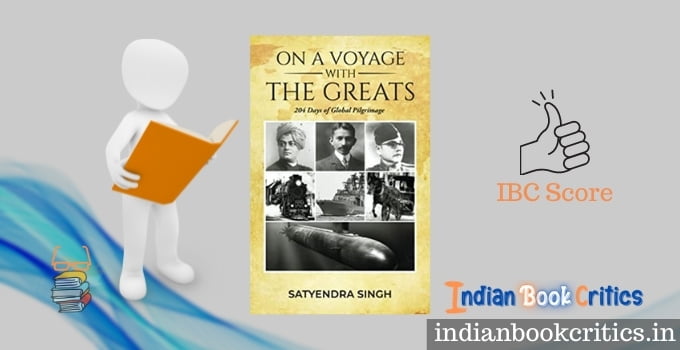Instantly, I agree with the author’s opinions (on many occasions, in this book). However, the point where Satyendra Singh asserts that the nation that ignores history has no past – and no future as well, through words by Robert A. Heinlein, the popular sci-fi author from the USA, I fully agree and even extend his idea by adding that any country that ignores history ceases to exist as the same country. India has been a nation that witnessed the births and deaths of uncountable super-humans and they did not wear red-marked underwear to announce they were super-beings. Their aura and actions were more than enough to do so. The book discusses the lives of three great sons of India, Gandhi, Swami Vivekananda and Netaji Subhash Chandra Bose. However, this book does not discuss the lives of these great persons in an a-b-c-d manner. The author has tried to stitch together the journeys undertaken by these individuals that changed the world. Vivekananda’s journey from Vancouver to Chicago, Gandhi’s journey from Durban to Pretoria and Netaji’s journey from Keil to Tokyo… these journeys are discussed in detail and we get to know many facts that we might have casually ignored or not been able to find in usual biographies. With a quote that features the gist of this book (or virtually any historical book), let’s begin the review:
“It is my belief that our past is an asset for us, and the learnings can be used for the betterment of our country. Not many countries have such a vivid history as India has. It is also my belief that history is not merely an account of events and dates. History is about messages and lessons which our past gives us – both the pride and the disappointment.”
The also ascribes a philosophical dimension to history and urges for action rather than being submissive and haplessly admire or weep over things pleasant and ugly. While reading the experiences (that might have been) of Swami Ji in the city that changed not only his and our country’s but rather the world’s fortunes, it seems that the author has done his craftmanship to the zenith. However, if you read it with critical eyes (and pardon me for being so cynical or choosy but the author [or the editors] might have been the same), you will find that Satyendra has been very selective in the only quotes that he has used – one about cast-atrocities in India (that is much-debated these days) and one telling to ‘kick out the priests who are always against progress. However, not even a single line from the historic and immortal speech that Swami Ji made in the actual Parliament of Religions has been mentioned. It does bother. It might be erroneous editorial advice or the author’s call – either way, it does not align with the whole episode. Ironically, in the next chapter, Gandhi is shown leaving for South Africa, BY THE SEA – one might wonder, why some priests allow him? Moreover, the humourless and rather callous comparison between Swami Ji’s speech and the terror attack of 9/11 doesn’t suit the flow of the wonderful storytelling and it did not humour me, being frank.
Gandhi’s journey has been colourfully presented and the readers will find an opportunity to zoom in on the events that might have led a simple person with earthly ambitions to do something for others. Subhas Babu’s journey will bring many known and unknown events from his life-in-exile to the light and readers will surely enjoy that chapter. The author has been factually imaginative and even young readers will find this part biography rather interesting and ‘not dry’.
Talking about technical aspects of the book that I happen to like most of the time, it is ideal in terms of length, style and purpose. I do agree with the author that readers must take small breaks from usual leisure reading and read something that showers light upon events of the past and, at the same time, let us ruminate about the things that might be useful for us. This is history but in a different style, the one that you can enjoy reading, the one that does not offload all the pomp of numeric upon you.
The writing style is fluid and the pages keep flipping on their own if you are absorbed in reading the book (and you do get absorbed, eventually). The introduction by the author before the journey begins and the conclusion that sums up everything nicely are wonderfully written and the author does place himself high in the mind as a reader. Something different, done differently, finished in a style that you end up admiring. You might not agree with the choices or the order of things that are presented in the book. However, you do get perspectives and ideas by reading the same. Enjoy your time onboard!
You can get a copy of this wonderful book from Amazon India by clicking the link below:
Buy the book from Amazon – click here
Review by Anand S J for Indian Book Critics
On a Voyage with The Greats: 204 Days of Global Pilgrimage by Satyendra Singh – Review
-
IBC Critical Score
Summary
On a Voyage with The Greats: 204 Days of Global Pilgrimage by Satyendra Singh is a wonderful non-fiction book that lets the readers enjoy the onboard experience of voyages (and a little more) undertaken by the three great human beings from India who did a lot for the nation!
